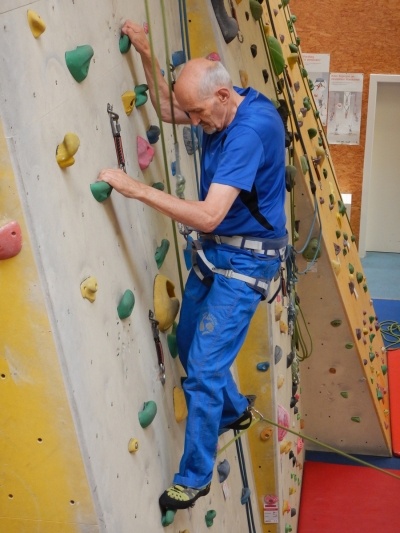The aim of the study is to scientifically investigate the effect of sport climbing on quality of life in patients suffering from Parkinson’s disease (PD) in a holistic approach. The research team strongly believe, that sport climbing training in PD will complement the existing field of trainings therapy and will provide PD patients with new perspectives and the experience that no hurdle is too high to be insurmountable.
Eingereicht von: Dr. med. univ. Heidemarie Zach, Bakk.rer.nat
Firma/Universität: Medizinische Universität Wien – Univ. Klinik für Neurologie
Homepage: www.meduni.ac.at
Kooperationspartner: Sportstättenverein Marswiese
Background: Sport climbing (SC) is known as a whole-body workout, which additionally trains cognitive, mental and social abilities. In contrast to its public image, SC in a controlled environment using “top-rope” belay, is a safe sport and can be performed at any age and any level. In the field of neurological rehabilitation, it is already used as “therapeutic SC” (e.g. for stroke, multiple sclerosis, depressions etc.).
 To date there are no studies, investigating the effects of SC in patients with Parkinson’s disease (PD). Even though, benefits of SC seem to be especially relevant for PD patients, who suffer from physical, psychological and social impairments.
To date there are no studies, investigating the effects of SC in patients with Parkinson’s disease (PD). Even though, benefits of SC seem to be especially relevant for PD patients, who suffer from physical, psychological and social impairments.
Physical benefits of SC tackle especially PD related impairments such as flexibility, core stability, posture, balance and improve range of motion and establish new motion patterns. Proven psychological benefits of SC promise to also counteract psychological PD symptoms. SC is known to be a cognitive challenging sport, which increases self-efficacy, motivation, mood and has an antidepressant effect. Furthermore, training in climbing groups improves social skills by multiplying social contacts, increasing self-esteem and self-awareness due to experience of self-control and independence, factors, which are impaired in PD.
To date, no single – neither pharmacological, nor non-pharmacological – intervention is known to have the potential to cover all effects on those debilitating PD symptoms at once.
Methods: The research team will evaluate effect of SC on quality of life (QoL) in 48 PD patients. The group will be randomized into a climbing group (n=24) and a control group (‘independent activity group’ n=24). The climbing group will follow a 12-week 90 min/week climbing trainings course, led by professional climbing instructors.
The control group, will receive education/information material of the WHO recommended European physiotherapy guidelines for physical activity and will be instructed to follow the recommendation of the guidelines to independently lead an active lifestyle with unsupervised training.
All patients will be evaluated with QoL questionnaires at baseline, in between the study period (mid), after completing the 12-weeks study period (post) and after 6 months (follow up). Additional outcomes will be health benefits of SC in PD, covering biopsychosocial aspects. To complete this holistic approach, non-motoric and motoric parameters with questionnaires, a semi-structured interview, as well as clinical assessments using motor rating scales and wearable sensors will be evaluated.
Hypothesis: To find significant improvement of QoL parameters and the secondary outcomes in the climbing group compared to control group at 6 weeks, 12 weeks and 6 months after the intervention.
